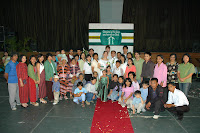I first came to Japan summer of 2001 for 3-months JICA Farm Management Training at the National Agricultural Research Center (NARC) in Tsukuba Science City. At that time, I was privileged to stay at the JICA Training Center where there were other Filipino trainees, and most of the residents are foreign trainees from developing nations. Even with the occasional events and study tours, and the lectures on Japanese culture, what I observed was more of the Japanese academic community culture. I was interested to learn the Nihongo language then, but in three months and with a paper I needed to produce, all I managed to remember were the classic Konnichiwa, Ohaiyo gozaimasu, Konbangwa, Sayonara, Itadakimasu, and Gochisu sama, not to mention the dame word kuso that a Japanese colleague kindly taught me with a stern warning never to use it because I’m a lady. Apart from the methods and the research discipline I learned from my research adviser and colleagues at the laboratory then, my best memories of those three-months were my times together with nine wonderful women, some old enough to be my okaasan, mostly my oneesan. They were administrative assistants from the varied laboratories at NARC, and we always ate our obento together. We had proper seats then so we always knew who was not around. Not a day passed without a good laugh. I can still picture that room and each of their faces, and that one beautiful lunchtime when I blew candles for my birthday.
Five years after, I’m back, and this time in this brave new world of Kochi, a sister province of Benguet province, my hometown. It’s been more than three months now, and it’s altogether another wonderful experience. My first few weeks were not easy as I practically doomed myself to thinking that I’m a forlorn figure in this part of the world, despite having the kindest adviser anybody can have. As weeks drew into months though, my phone calls gradually waned from daily to weekly, and I gradually saw the beauty of this humble, quiet, and safe community. Just as the shinkansen has not started running in its rails yet, life in Kochi is not yet as fast-paced as in Tokyo or other bigger cities in Japan. I see people from neighboring houses shouting Ohayou behind fences, and taking time to chat, sharing a word or two. They still probably know who lives in the house next door, and it warms my heart just watching them. I also like the times when a simple question gets me talking with old women or men in the train or in the bus, which becomes a springboard for a longer talk. I am always willing to try my newly learned Nihongo words, and they are always more than willing to tolerate my struggling Nihongo or practice their Eigo, and we always end up having a fun conversation. There was even a time I had so much fun that I completely forgot to drop my fare, so I had to pay to the next street car that came by. Though I have yet to make a buddy, my acquaintances in Kochi so far are kindhearted, helpful, and have a zest for life and learning. And true to their being Japanese, they are health buffs, and given to challenges, which probably explain their long average lifespan. This passion and goal for long life among the Japanese is contagious, and it’s probably one of the first things I am psyched up thus far.
In these two periods, I’m always asked to compare my country and Japan. It’s easy to do that when one thinks logically. It’s almost always like a stereotyped comparison of a developed country and a developing country from the perspective of economics. Japan is rich; the Philippines is poor. Japan’s population is decreasing; the Philippine population is increasing. Transportation is convenient in Japan; it is inconvenient in the Philippines. Japan’s culture is traditionally rich; the Philippine culture is a mix of traditional and an agglomeration of varied cultures from foreign colonizers. It can go on and on and on. But the following line from the poem written by Kaneko Misuzu perfectly captures and describes what I personally think about Japan and the Philippines, or about the Filipinos and Japanese, or between any nations or peoples for that matter:
“鈴と小鳥, それから私, みんなちがって、みんないい”.
(Suzu to kotori, sorekara, watashi, minna chigatte, minna ii)
In parallel, nations and peoples are diverse, and when one recognizes and appreciates this diversity, one can say with great confidence in the creator God that indeed, minna chigatte minna ii. What is even more amazing with this perspective is even within nations and peoples, individuals are diverse and have varied capacities. And however, great are the temptations to generalize and say that living in Japan is safer or living in the Philippines is impossible; Filipinos are warm and sweet, and Japanese are distant and withdrawn; or that Americans are peace-loving and Muslims are trouble-makers, there are just too many cases and situations when one is proved grossly wrong or proved otherwise.
And so with this perspective, I try to live my life, and enjoy each day here in Kochi. With this perspective, I look forward to three years more of living with the Japanese brethren. And as I learn from them, enjoy their hospitality, and share my life with them, I know that just as there is life sublime in the Philippines despite all its tribulations, there is too here in Japan despite its vast economic resources.
(This is an article published in the Akebono No. 25 :March, 2007 - a publication produced by the Kochi University Volunteer Association for Foreign Students circulated within the association members.)






















